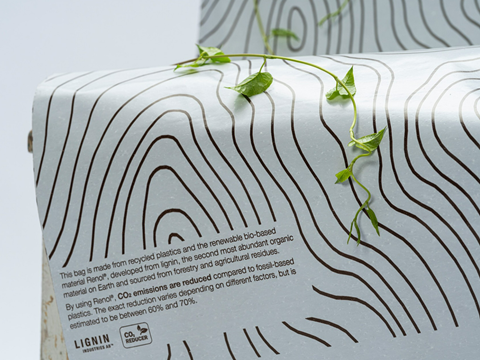
E-commerce packaging company Modepack has revealed its mailing bags created from lignin and post-consumer recycled plastics, said to cut CO2 emissions by up to 60–70% compared to conventional recycled plastic mailers.
The Lignin Mailing Bags are made from a blend of recycled LDPE and Lignin Industries’ Renol, a renewable thermoplastic derived from lignin, a forestry byproduct. Modepack says that with recent advancements in biomaterials from Lignin Industries, it has engineered a mailer that combines durability and environmental responsibility.
The company adds that the bags deliver emission savings through using renewable inputs, re-purposing industrial waste, energy-efficient production and compatibility with LDPE recycling streams. Designed to be moisture resistant and tear-proof, the bags are suitable for online retailers aiming to improve their environmental commitment while delivering ‘exceptional’ customer satisfaction.
Earlier this year Lignin Industries announced the raising of €3.9 million in funding to accelerate the scale-up of its bio-based thermoplastic derived from trees, aiming to end reliance on fossil fuel-based plastics. The company has partnered with UK-based compounder and distributor Hellyar Plastics to work with customers across sectors including consumer electronics, home accessories, appliances and construction.
At the start of 2025, researchers at the Fraunhofer Institute for Process Engineering and Packaging IVV revealed they were converting peatland plants into folding boxes, trays, and other paper-based packaging in search of an alternative, low-lignin raw material to wood. Researchers have actively cultivated reed, sedge, reed canary grass and other peatland plants in rewetted peat bogs and fens to test their viability in packaging applications.
If you liked this story, you might also enjoy:
The ultimate guide to the Packaging and Packaging Waste Regulation in 2025
How are the top brands progressing on packaging sustainability?
Everything you need to know about global packaging sustainability regulation in 2025














No comments yet